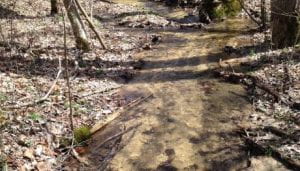EEOB 3410: Ecology Lecture and Lab

This course explores the distributions and abundance of and interactions between species, populations, communites, ecosystems at both the local and global scales. The lab portion includes a critique of ecological primary literature, analysis of ecological data, and design and execution of experiments, fieldtrips, and research paper writing.
EEOB 5420: Ecology of Inland Waters (formerly Limnology)
 This course examines the structure and function of “inland water” ecosystems with application to water quality, fishery and pollution problems. Emphasis is on the comparative analysis of aquatic ecosystems, examining lakes, ponds, wetlands, streams, rivers, and estuaries. Lectures acquaint students with the current state of our knowledge in the aquatic sciences. Labs familiarize students with some of the most common methods of sampling and analysis of natural waters, sediments and organisms, as well as data analysis. Labs also include a 3-day fieldtrip to OSU’s Stone Laboratory (http://stonelab.osu.edu/).
This course examines the structure and function of “inland water” ecosystems with application to water quality, fishery and pollution problems. Emphasis is on the comparative analysis of aquatic ecosystems, examining lakes, ponds, wetlands, streams, rivers, and estuaries. Lectures acquaint students with the current state of our knowledge in the aquatic sciences. Labs familiarize students with some of the most common methods of sampling and analysis of natural waters, sediments and organisms, as well as data analysis. Labs also include a 3-day fieldtrip to OSU’s Stone Laboratory (http://stonelab.osu.edu/).
EEOB 5470: Community and Ecosystem Ecology
 This course will focusus on ecosystem ecology and biogeochemistry of ecosystems. Community ecology is defined by the mechanisms of coexistence, the boundaries between distinct communities and the relative importance of distinct interactions within and between populations. In an ecosystems ecology approach, the detailed features and roles of individual organisms, populations and communities are de-emphasized and integrated, and the net impact of these and other levels of organization on overall ecosystem elemental and energy budgets and cycles is evaluated. Our general approach in the course is highly interdisciplinary and examines the interplays and feedbacks between key physical, chemical, geological and ecological parameters and processes.
This course will focusus on ecosystem ecology and biogeochemistry of ecosystems. Community ecology is defined by the mechanisms of coexistence, the boundaries between distinct communities and the relative importance of distinct interactions within and between populations. In an ecosystems ecology approach, the detailed features and roles of individual organisms, populations and communities are de-emphasized and integrated, and the net impact of these and other levels of organization on overall ecosystem elemental and energy budgets and cycles is evaluated. Our general approach in the course is highly interdisciplinary and examines the interplays and feedbacks between key physical, chemical, geological and ecological parameters and processes.
EEOB 8896: Global Change Ecology
 This course explores the recent literature highlighting impacts of global change on various aspects of terrestrial, freshwater and marine systems, including ecosystem structure and function, community and population ecology, biogeochemical cycling, and their relationship to changing physical forcing functions such as temperature, CO2, and water and energy budgets. The course includes 1) class presentations on the fundamentals of global climate change, 2) readings from key up-to-date published resources on the concepts of glacial-interglacial and shorter-term global change (for example, “Earth’s Climate, Past and Future” by W.F. Ruddiman; recent International Geosphere-Biosphere Program Reports; and the Pew Oceans Commission Report, to name but a few), 3) review of relevant paleoclimate and paleoecology information for familiarizing ourselves with the evidence for changing global forcing functions and their manifestation in terrestrial, freshwater and marine systems during previous periods of Earth history, and 4) readings and critical discussions of compelling papers from the contemporary peer-review literature on global change and modern ecosystems. Student participation in discussions and background presentations is required. This is a seminar-style 2 credit course that meets once a week, and will be offered fall quarter in even years starting Fall 2012.
This course explores the recent literature highlighting impacts of global change on various aspects of terrestrial, freshwater and marine systems, including ecosystem structure and function, community and population ecology, biogeochemical cycling, and their relationship to changing physical forcing functions such as temperature, CO2, and water and energy budgets. The course includes 1) class presentations on the fundamentals of global climate change, 2) readings from key up-to-date published resources on the concepts of glacial-interglacial and shorter-term global change (for example, “Earth’s Climate, Past and Future” by W.F. Ruddiman; recent International Geosphere-Biosphere Program Reports; and the Pew Oceans Commission Report, to name but a few), 3) review of relevant paleoclimate and paleoecology information for familiarizing ourselves with the evidence for changing global forcing functions and their manifestation in terrestrial, freshwater and marine systems during previous periods of Earth history, and 4) readings and critical discussions of compelling papers from the contemporary peer-review literature on global change and modern ecosystems. Student participation in discussions and background presentations is required. This is a seminar-style 2 credit course that meets once a week, and will be offered fall quarter in even years starting Fall 2012.